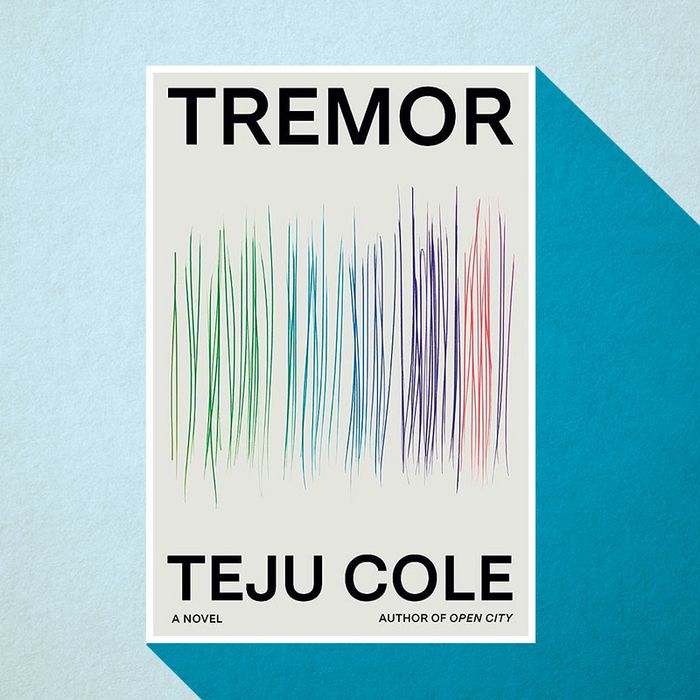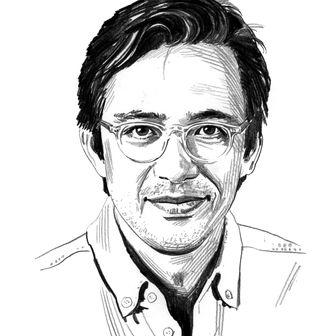
When the novelist Teju Cole made his American debut in 2011 with Open City, it was clear that he was one of those rare creatures: a writer fully formed. The book follows a half-Nigerian, half-German psychiatry student named Julius who takes long, lonely walks across Manhattan late at night. These peregrinations are as mental as they are physical: As one neighborhood dissolves into the next, his mind skips from classical music to Chaucer to the transatlantic slave trade to memories of his childhood in Lagos. Imagine a younger version of the wandering, ruminative narrator in the books of W.G. Sebald, except instead of the English countryside, Cole’s protagonist is traversing a city where the open wounds of 9/11 are still visible. And while Cole adopts Sebald’s detached, melancholy affect, Julius is edgier, livelier, more worldly. The narrators of Sebald’s books never hankered for Goan fish curry.
This sort of plotless, discursive writing, in which a swirl of associations and memories and ideas are held together by the centripetal force of an impeccably educated flaneur, is exceedingly difficult to pull off without sounding like a colossal bore — and Cole did pull it off, with great lyricism and sensitivity, his sentences strolling majestically through Julius’s neighborhood in Morningside Heights.
Cole’s long-awaited follow-up, Tremor, has a lot in common with its predecessor: Its protagonist, Tunde, meditates on art and history and reminisces about his childhood in Lagos as he rambles across time and space. But this is a far weaker book than Open City, trading the dark complexities of character for po-faced lectures and moral self-regard. The problem is not the craft, even if Tremor is not the flawlessly cut jewel that is Open City. It is, I think, a problem of politics. The central emotion of the earlier book is ambivalence. Julius is unsure whether he’s Nigerian or German or even a New Yorker. He bristles at the presumption that he might have anything in common with his African “brothers,” while expressing an uneasy solidarity with radical Arab students who hate the United States. He is the ultimate cosmopolitan, at home everywhere and nowhere — a fluid figure perfectly suited to deciphering a globalized world riven by dislocation, terror, and economic crisis.
Tunde is also a cosmopolitan. He lives in Cambridge, teaches photography at Harvard, travels the world. But Cole is no longer interested in ambivalence. Tremor is one of the most politically unobjectionable books I’ve ever read: It is hard to disagree with anything Tunde thinks and feels, making him a perfect representative of a different era, one in which the cosmopolitan ethos of haughty independence has come under suspicion and the claims of group identity have never been stronger. Whether such a figure makes for good reading is another matter.
Tremor begins on an ominous note: Tunde is taking photographs late at night in his neighborhood when a harsh voice calls out that he is on private property. Tunde, shaken by his neighbor’s aggressiveness, packs up his camera and walks away, his art thwarted by this invisible menace. The scene is troubling not because we believe something awful might happen to Tunde, but because it presents the book’s themes — the peril of being a Black body in a white space, the inability to be oneself in a racist society — so overtly. From the opening sentences, we know exactly what sort of novel we’re going to get.
Cole proceeds with great solemnity to fulfill those expectations. Tunde and his partner, Sadako, visit an antique store in Maine where they come across a West African headdress known as a ci wara, which prompts Tunde to catalogue the ways in which the concept of authenticity has been corrupted by museums and art dealers in the West. Tunde sees a note documenting an Indian attack on a white homestead in the 18th century, which leads him to think about how Native Americans have been turned into villains in historical narratives of white victimhood. He goes to check out a book from the Kennedy School, where a librarian rushes up and asks if she can help him “in a tone he recognizes.” White racism is the medium through which Tunde moves, as if it were a bad dream, the very air.
While I don’t doubt the veracity of this depiction of contemporary Black life, it has specific consequences for the kind of plotless book Cole favors. All those freewheeling associations now circle the same drain to deadening effect. There is, too, an uncharacteristic obviousness to each discovery Tunde makes about “the obliterative arrogance of Western culture.” The arcane forays of Open City came as revelations, opening the reader up to both the wonder and the brutality of the world. Tremor feels closed off in comparison, laboring across ground that has been trod by so many fellow travelers.
For example, there is a scene in which Tunde delivers a sweeping lecture at Boston’s Museum of Fine Arts on how Western museums plundered former colonies for their collections — a topic that would presumably be familiar to anyone who has read a newspaper recently. In many ways, this essayistic form is Cole at his best, weaving together a discussion of the paintings of J.M.W. Turner with riffs on avant-garde poetry to make the case that the museum is “a storehouse of other people’s stolen worlds.” Yet Cole presents this lecture, with its deftly delivered but wholly uncontroversial thesis, as one that would cause an educated, progressive audience discomfort and fear.
This passage inaugurates a series of pastiches that comprise the central portion of the book. The lecture borrows from J.M. Coetzee’s Elizabeth Costello, in which the eponymous protagonist delivers several provocative speeches to academic audiences that cause them actual discomfort (positing, say, that meat eating is an equivalent moral crime to the Holocaust). It is followed by a succession of first-person vignettes from various people from Lagos, recalling the choral narrators of Svetlana Alexievich’s books about the Soviet Union. And finally Cole conjures a dreamy abstraction about Lagos that could have been taken from Italo Calvino’s Invisible Cities, wherein the narrator suggests that “all cities are essentially the same wherever they might be located on the world’s map.”
These are also the most enjoyable sections in Tremor. The reader (and, apparently, the writer) is delighted to be released from Tunde’s morose musings. We are treated to rare flashes of irreverent humor, such as when one Lagosian declares, “I mean there’s something about Macbeth that always works well in an African context, all those witches, all that blood and struggle for power.” But though these passages are told with skill and confidence, it’s hard not to detect a larger crisis of confidence lying behind this postmodern mimicry, as if Cole knows he can’t trust Tunde to carry the book on his own.
This might be because the central tension in Tunde’s life is “his wish to be good.” He is having problems with Sadako — he is reticent, remote — but diligently works to solve them. He is a conscientious teacher, a loyal friend, an ally of the downtrodden and the oppressed. He is a kind of saint, which is not quite the same thing as a human being and the opposite of what Julius is: a monster. Toward the end of Open City (and here comes a significant spoiler), a woman accuses Julius of raping her when they were young — an incident that he has buried under his high-minded thoughts about Mahler and Barthes. The revelation comes as a genuine shock, completely altering all that has gone on before and raising the possibility that Julius thinks so much about art, history, and literature not to better engage with life but to escape it. It also has the effect of implicating the reader who has been in his thrall.
Tunde is also a character who implicates the reader, though in ways that enlarge the gap between them. There is a moment when Tunde and a research assistant have a wordless dialogue about how every time he crosses Harvard Yard, he thinks of the four men and women who were enslaved there by two presidents of Harvard in the 18th century. The suggestion is that Tunde and his acquaintance are the only two people who bother to make this silent commemoration.
In a 2014 essay for The New Yorker, Cole dwells on James Baldwin’s lament that he feels alienated from the stately pillars of white European culture: Rembrandt, Shakespeare, the Cathedral at Chartres. Cole makes a decisive break with him: “This is where I part ways with Baldwin. I disagree not with his particular sorrow but with the self-abnegation that pinned him to it. Bach, so profoundly human, is my heritage. I am not an interloper when I look at a Rembrandt portrait.” I remember loving this sentiment when I read it the first time — I still love it. It exudes the cosmopolitan spirit, the sense that nothing will remain foreign to you if you have a mind and a will and an openness.
In 2023, Cole visited the Rijksmuseum in Amsterdam for an after-hours tour of its monumental Vermeer exhibition and wrote about it for The New York Times Magazine. Here he is not so ready to claim a Dutch master as his patrimony; he is annoyed by the unreserved adulation surrounding the show and preoccupied with the evidence of colonialism, largely unnoticed by others, that is everywhere in Vermeer’s paintings — the wooden box “most likely” from Goa, the pearls harvested from the strait between India and Sri Lanka. He does seem like an interloper here, alone with the knowledge that these “immortal pictures” are not “mere decorations or technical achievements.”
Cole’s evolution, if that’s what it is, is understandable. Racism is not something you grow out of or transcend, and its effects can become more pernicious the longer you live in this country. Also, as a Black man, Cole might have grown wary of being used by white critics to reinforce the old white-dominated order. (“His material world is set in the center of white learning,” Cole writes of Tunde. “He is in the center of that and he flowers in it, not without some doubt, not without some shame.”) And with age comes the realization that you are not a self-created individual free of your parents, your race, your country — that the key to who you are may lie in the area of darkness that precedes your birth.
Still, there is something of Baldwin’s “self-abnegation” that has crept into Cole’s work. At the end of Tremor, Tunde finally takes the photograph that was denied him at the beginning of the book. But what should be a moment of triumph is followed by a dizzying attack of vertigo — he has soared too high too quickly and is brought back down to earth.
The appeal of cosmopolitanism lies in its assertion of some independence from race and other markers of identity, which, no matter how overbearing, can never wholly define you. And while it would be irresponsible for anyone to forget their ancestors, I doubt that these forebears would have wanted their hardships to weigh so heavily on their sons and daughters. Cole started his career as a high-flier, and not even the most jealous ghost of the past would deny that the sky is where he belongs.
More Book Reviews
- The Minority Report Gets a Trump-Era Update
- Chimamanda Ngozi Adichie’s Frustrating Return
- Neko Case Survived It All


